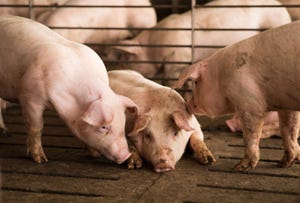Trade report calls out China for unfair practices
Legislative Watch: Phase One Agreement reforms failed; USDA announces $1.5 billion in conservation funding; Mexico delays glyphosate ban.
April 5, 2024
In an annual report cataloguing trade barriers, U.S. Trade Representative Katherine Tai identified significant problems with the way China treats U.S. agricultural imports. Reforms promised by China in former President Trump’s 2020 “Phase One Agreement” have failed to materialize, and the country continues to raise barriers to American agricultural goods.
“Importantly, it is clear that the Phase One Agreement has not led to fundamental changes to China’s state-led, non-market trade regime or its harmful impact on the U.S. economy and U.S. farmers, ranchers, workers and businesses,” the report said.
Problems with Chinese trade go beyond this failure, with government officials creating trade barriers with little justification or scientific support.
“China remains a difficult and unpredictable market for U.S. agricultural exporters, largely because of inconsistent enforcement of regulations and selective intervention in the market by China’s regulatory authorities,” the report said. “China’s unwillingness to routinely follow science-based international standards and guidelines and to apply regulatory enforcement in a transparent and rules-based manner further complicates and impedes agricultural trade.”
USDA announces $1.5 billion in conservation funding
The Regional Conservation Partnership Program plans to award $1.5 billion in its next round of funding this summer, according to Secretary of Agriculture Tom Vilsack. According to USDA, the funds “will help farmers, ranchers and forest landowners adopt and expand conservation strategies to enhance natural resources while tackling the climate crisis.”
Under the RCPP, projects can cover a variety of on-the-ground conservation activities. Examples given by USDA include land management, improvement, and restoration practices; land rentals; easements and public works or watersheds. The funding will be divided in half, with one portion dedicated to “Critical Conservation Areas” and the rest marked for statewide programs.
In a press release, Vilsack said, “We had unprecedented demand for the Regional Conservation Partnership Program last year, showing the robust interest in conservation from farmers and ranchers. Through the increase in funding from President Biden’s Inflation Reduction Act, we’re able to invest even more this year in this important program, increasing our impact across the landscape. We’re looking forward to seeing what the more streamlined and customer-oriented Regional Conservation Partnership Program can do to get more conservation on the ground in the coming months and years.”
Awards under the program are made to state governments and private organizations. Applications for the current round of funding are due by July 2. The minimum award amount is $250,000 and the maximum is $10 million.
Mexico delays glyphosate ban
Just days before it was scheduled to begin, Mexico postponed implementation of a ban on glyphosate. The controversial measure was originally announced in February 2023 and would have banned authorization and permits for glyphosate use, import, production and distribution on April 1, 2024.
However, on March 26, the Mexican federal government announced it had determined that there is currently a lack of suitable glyphosate alternatives to allow the ban to proceed. The government will continue to search for potential low-toxicity substitutes to glyphosate before imposing the ban.
The original proposal came under fire, with opponents arguing it could cause up to 40% declines in crop production without a viable alternative. The U.S. has also raised concerns, warning that the effort could run afoul of the USMCA trade agreement and endanger free flow of agricultural goods between the two countries.
About the Author(s)
You May Also Like





